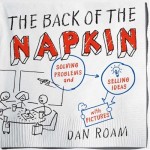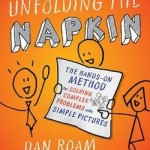50% Improvement in Creativity in 4 Days
 A recent study reported by the University of Utah demonstrated a significant improvement in creativity in a group of subjects that completed a 4-day nature hike. Importantly, the hikers did not have access to electronic devices such as phones or computers. It is not clear exactly what caused the boost in creativity – physical exercise, exposure to nature, unplugged from technology, disruption in routine, other factors or a combination of factors but the effect was clear:
A recent study reported by the University of Utah demonstrated a significant improvement in creativity in a group of subjects that completed a 4-day nature hike. Importantly, the hikers did not have access to electronic devices such as phones or computers. It is not clear exactly what caused the boost in creativity – physical exercise, exposure to nature, unplugged from technology, disruption in routine, other factors or a combination of factors but the effect was clear:
“We show that four days of immersion in nature, and the corresponding disconnection from multimedia and technology, increases performance on a creativity, problem-solving task by a full 50 percent,”
The researchers used the Random Association Test to measure creativity. This is a 10-question test where each question presents three words and your job is to come up with a fourth that relates them. For example, the series Falling, Actor, Dust is tied together by the word Star. Or you need to come up with the word Candle to relate the three-word series Stick, Light, Birthday. For some samples to try yourself go HERE. Don’t look at the second page until your done. It is the key.
Interested to hear from readers that spend time in nature or intentionally unplug from TV, phones and other gadgets as a way to improve cognitive performance.
Source of Image: Valley of the Gods
Categories: Problem Solving Tags: creativity
Using Technology to Supercharge Kid’s Creativity
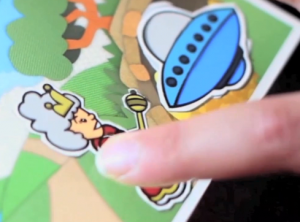 Children are naturally creative. Very creative. As parents we want to enhance our kid’s creativity and make sure that it gets carried forward into adulthood. One tool that aspires to do that is the iPad App Toontastic from Launchpad Toys. Kids draw free style and move around a number of characters (e.g. pirates, queens, monkeys) and narrate a story as they play. All the while the App records what they do and compiles it into a cartoon that can be shared online with friends. So far they have 600,000 story tellers from 150 countries that have made more than 2 million cartoons.
Children are naturally creative. Very creative. As parents we want to enhance our kid’s creativity and make sure that it gets carried forward into adulthood. One tool that aspires to do that is the iPad App Toontastic from Launchpad Toys. Kids draw free style and move around a number of characters (e.g. pirates, queens, monkeys) and narrate a story as they play. All the while the App records what they do and compiles it into a cartoon that can be shared online with friends. So far they have 600,000 story tellers from 150 countries that have made more than 2 million cartoons.
While Launchpad Toys does not claim that the App will improve creativity they designed it to do just that. The company argues we are in a creativity crisis by pointing out that creativity scores have been dropping since 1990 (especially in kids 5-12 years old) just when society and the workplace needs innovation the most.
I am interested to hear from readers that are using Apps to improve cognitive performance in kids.
Categories: Child, Problem Solving Tags: creativity
Will Playing Video Games Boost Kid’s Creativity?
 The answer is yes according to recent research at Michigan State University. They studied 500 12-year-olds and found that playing video games increases creativity when it comes to drawing pictures and writing stories. The finding is robust:
The answer is yes according to recent research at Michigan State University. They studied 500 12-year-olds and found that playing video games increases creativity when it comes to drawing pictures and writing stories. The finding is robust:
“… regardless of gender, race or type of game played by the students, the study found a relation between video game playing and greater creativity.”
They also found no increase in creativity through the use of computers, the Internet or smart phones.
Interested to hear from readers that include video game playing in an effort to develop their children’s brain function and cognitive performance.
Categories: Child, Problem Solving, Software Tags: creativity, games
Warm Up Your Mood to Boost Creativity
 Warming up is clearly important for safety and high performance in physical activities and competitive sports. The same is true for mental activity and cognitive sports.
Warming up is clearly important for safety and high performance in physical activities and competitive sports. The same is true for mental activity and cognitive sports.
In an earlier post we discussed how having a friendly social conversation for 10 minutes to warm up your brain will improve cognitive performance. Now CNN Health reports on two recent studies that show humor or positive mood can improve creativity and puzzle solving ability.
More specifically, one study found that watching YouTube videos that put you in a good mode (watching a happy baby) increases your ability to learn a rule to categorize a problem.
This suggests simple mood elevating techniques can warm up your brain and improve cognitive performance. Need to be creative? Take time out to laugh.
Source: Happy Baby Image
Categories: Lifestyle, Problem Solving Tags: creativity
Reclaim Your Divergent Thinking Talents
Many older adults worry about memory loss. This is a serious issue especially if it leads to dementia and the inability to do the activities of daily living.
But just as serious, and more so in many ways, is the dramatic loss of divergent thinking skills in young children.
One long-term study found that in a group of 1600 children those that ranked tops in divergent thinking dropped dramatically with age. Specifically, those achieving a top score for divergent thinking went from 98% in kindergarten to 32% five years later to just 10% when they reached early teens. Divergent thinking is a natural talent and is rapidly educated and socialized away.
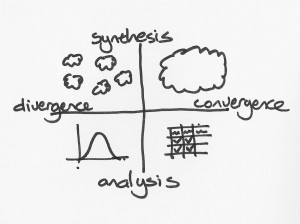 Divergent thinking is the capacity to see multiple options, alternatives or possibilities. The goal is not to find a solution but instead find an enormous range of potential and therefore very different solutions. For example, how many interesting uses can you find for a rubber band? On average people might find 10-20, genius level performance would generate in excess of 150. The trick to generating many more options is to begin to relax assumptions about what a rubber band is. What if it was a mile long? Of course, some would claim that is cheating, as we have all been taught to do. Just as there is one right answer so why worry about so many?
Divergent thinking is the capacity to see multiple options, alternatives or possibilities. The goal is not to find a solution but instead find an enormous range of potential and therefore very different solutions. For example, how many interesting uses can you find for a rubber band? On average people might find 10-20, genius level performance would generate in excess of 150. The trick to generating many more options is to begin to relax assumptions about what a rubber band is. What if it was a mile long? Of course, some would claim that is cheating, as we have all been taught to do. Just as there is one right answer so why worry about so many?
The question is how can we reclaim our genius level of performance in divergent thinking? How can we then channel it into creative expression and break-through problem solving?
Mind mapping, journaling and traditional brainstorming are techniques that are typically offered to those looking to build divergent thinking skills.
Start simple with brainstorming by yourself but apply it to a practical problem that means something to your right now.
Here is what you do. Let’s say you are buying a new computer. Use divergent thinking to decide what to do with the old one. Set a time limit (say 20 minutes at most), and list as many ideas as you can. Best to write them down. Go for the largest number, don’t worry if they are good/bad, look at how you can combine ideas and allow for the weird and strange. Have fun with it. Open up your mental jets.
 With continued practice your mind will get use to this mode of thinking again and you will start to reclaim your divergent thinking talent. Consider using mind mapping or some other way of seeing how your ideas related to each other visually. Include others. Let alternatives bubble up all day or all week and capture them in a journal as you go. Soon your thinking will diverge far and fast when you want it to. The payoff? Good ideas that you would have normally never even considered.
With continued practice your mind will get use to this mode of thinking again and you will start to reclaim your divergent thinking talent. Consider using mind mapping or some other way of seeing how your ideas related to each other visually. Include others. Let alternatives bubble up all day or all week and capture them in a journal as you go. Soon your thinking will diverge far and fast when you want it to. The payoff? Good ideas that you would have normally never even considered.
Interested to hear form readers that practice divergent thinking. What techniques do you use?
Categories: Lifestyle, Problem Solving, Training Tags: creativity, processing speed
Cognitive Advancement NOT Decline with Age
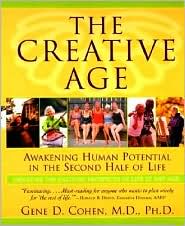 The theme behind this blog is that nature gave us the hind brain, mid brain and fore brain, now the Next Brain is up to us. A somewhat playful way of making the claim that we now have enough science, technology and practical insight to implement training programs and lifestyle changes that will significantly impact brain function and cognitive performance. The 80+ posts on this site are just scratching the surface.
The theme behind this blog is that nature gave us the hind brain, mid brain and fore brain, now the Next Brain is up to us. A somewhat playful way of making the claim that we now have enough science, technology and practical insight to implement training programs and lifestyle changes that will significantly impact brain function and cognitive performance. The 80+ posts on this site are just scratching the surface.
One of the most exciting trends that support the prospects of your Next Brain is the recent scientific work suggesting many important cognitive functions actually improve with age. Indeed, there maybe several stages of cognitive development that move us through adulthood and old age. I have blogged on this before but want to encourage you to read Cohen’s book, The Creative Age. It is inspirational at many levels but one of the things that is particularly striking are the examples he gives of major creative contributions made by older adults.
Some examples:
- Freud publishes the Ego and the Id (his major work) at 67
- Stradivaria (or Stradivarious) designed and built his two most famous violins – the Habeneck and the Muntz when he was 92
- Leaky made her most important archeological discovery (hominid footprints that are 3.5 million years old) when she was 65
- Alexanderson was award a patent on the color television reciever developed for RCA when he was 77
- A 65 year old physicist was the first to liquify helium in 1932
- Michelangelo was 72 when he was appointed architect for St. Peters in Rome
These examples are important because they demonstrate creative acts of global importance started and completed by older adults. This is very different from the many examples of older adults that are recognized for creative acts completed during younger years.
Now most of us are not world-class scientists, artisians, inventors or leaders but the message from these examples is still very relevant:
It is possible to continue to develop and use advanced cognitive skills as we age into our 60s, 70s, 80s and even 90s.
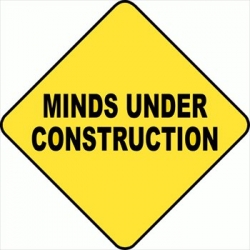 This challenges one of the major myths about the aging brain that shrinks, becomes forgetful, cannot grow new brain cells/connections, loses energy and in more and more cases slides into dementia. Clearly our minds are still under construction.
This challenges one of the major myths about the aging brain that shrinks, becomes forgetful, cannot grow new brain cells/connections, loses energy and in more and more cases slides into dementia. Clearly our minds are still under construction.
Perhaps we will ultimately learn that the decades of later adulthood and old age are in fact just the time and proving grounds we need to build our Next Brains.
Categories: Cognitive Decline, Older Adult Tags: creativity
14 Research Proven Ways to Improve Creativity
 The PsyBlog recently published a couple of posts outlining 14 techniques with supporting psychological research for being more creative. The posts are:
The PsyBlog recently published a couple of posts outlining 14 techniques with supporting psychological research for being more creative. The posts are:
I won’t repeat the techniques here as they are described and referenced well in the posts. They are worth a read and some experimentation.
I guarantee you will find at least 2 or 3 techniques you have not tried before.
Interested to hear from readers on specific techniques for boosting creativity.
Categories: Problem Solving, Training Tags: creativity
Is a Wandering Mind More Effective?
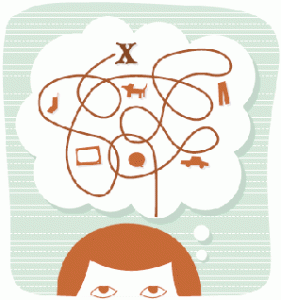 About a third of the time we are awake our mind is wandering. We are not focused on the topic at hand, we are zoning out. Not really in a full day dream just having thoughts unrelated to the tasks we are trying to do. We slip in and out of focus rapidly and often. It is worse if we are drinking or are having a craving.
About a third of the time we are awake our mind is wandering. We are not focused on the topic at hand, we are zoning out. Not really in a full day dream just having thoughts unrelated to the tasks we are trying to do. We slip in and out of focus rapidly and often. It is worse if we are drinking or are having a craving.
For those interested in improving cognitive performance and brain function it seems that mind wandering presents a major opportunity.
Even 10% less wandering during the day would mean 30 minutes or so more mental time on task! This puts a premium on using techniques, such as mindfulness, that naturally nudge the wandering mind back on task.
 Unfortunately the case is not that clear. There has been research that suggests a wandering mind is critical to enhance creativity. More recent research even suggests it may improve decision-making. Point being that our mind likely wanders for a reason and that reason is likely essential for high performance.
Unfortunately the case is not that clear. There has been research that suggests a wandering mind is critical to enhance creativity. More recent research even suggests it may improve decision-making. Point being that our mind likely wanders for a reason and that reason is likely essential for high performance.
For a good (and short) article on this topic check out Discovering the Virtues of the Wandering Mind. Interested to hear from readers on their view. Especially interested in any techniques for minimizing it or getting better cognitive performance from it.
Categories: Mental Focus Tags: creativity, mindfulness
Build Problem Solving Skills with Visual Thinking
Drawing a diagram can be a powerful problem solving technique. Creating a visual representation forces our brain to process information in a specific way and it provides something new for us to see or perceive. Any technique, no matter how simple, that cause us to think differently and see differently holds the promise for improving problem solving and creativity.
Visual techniques designed to systematically stimulated improved thinking will be a frequent topic on the Next Brain Blog. Take for example, the recent work by Dan Roam. He has two books on on using visual thinking including The Back of the Napkin and Unfolding the Napkin.
His work is based on a four-step approach to visual thinking including look, see, imagine and show.
If you want to a jump-start on Roam’s approach to visual thinking, check out this 8-page BPTrends review of the Back of the Napkin.
I am interested to hear from readers that have used visual thinking techniques to improve problem solving, creativity or other aspects of cognition.
Categories: Books, Executive, Leader, Perception, Problem Solving, Professional, Software, Training Tags: creativity
Can You Use the Internet and Mobile Phones to Rewire Your Brain?
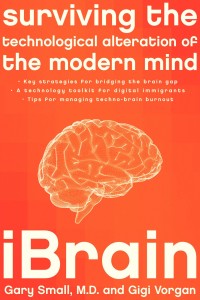 Email, search engines, social networking sites, text messaging, blogging, twitter, web-based phones, GPS, playing/making music/videos, taking and instantly sharing pictures and a slew of other technological capabilities have become widely available thanks to the internet, mobile phones and other hand-held gadgets. These new ways of creating, finding, sharing and using information are so powerful and pervasive that they are transforming how we learn, make-decisions, collaborate creatively and do many other brain-intense activities.
Email, search engines, social networking sites, text messaging, blogging, twitter, web-based phones, GPS, playing/making music/videos, taking and instantly sharing pictures and a slew of other technological capabilities have become widely available thanks to the internet, mobile phones and other hand-held gadgets. These new ways of creating, finding, sharing and using information are so powerful and pervasive that they are transforming how we learn, make-decisions, collaborate creatively and do many other brain-intense activities.
Some argue that they make us smarter or dumber. For example, the Atlantic Magazine article, Is Google Making Us Stupid? triggered a firestorm of discussion. Fortunately, the answer is no. Google and using search engines actually makes us smarter! Others take the point further and argue that the collective effect of all these technologies is driving a rewiring of our brains on a basic level. For a good introduction to this type of argument check out the book, Surviving the Technological Alteration of the Modern Mind.
The book’s theme is controversial but the authors do a great job outlining the specific technologies and their likely impact on boosting or dowsing cognitive performance. This is just the kind of information we will be covering in the Next Brain Blog. I will look at each claim and recommendation in later posts.
In the meantime, I am interested to hear reader stories on how the internet or mobile computing is being used to improve cognitive performance and build a better and longer-lasting brain.
Categories: Books, Decision Making, IQ and EQ, Memory and Learning, Perception, Software Tags: creativity

